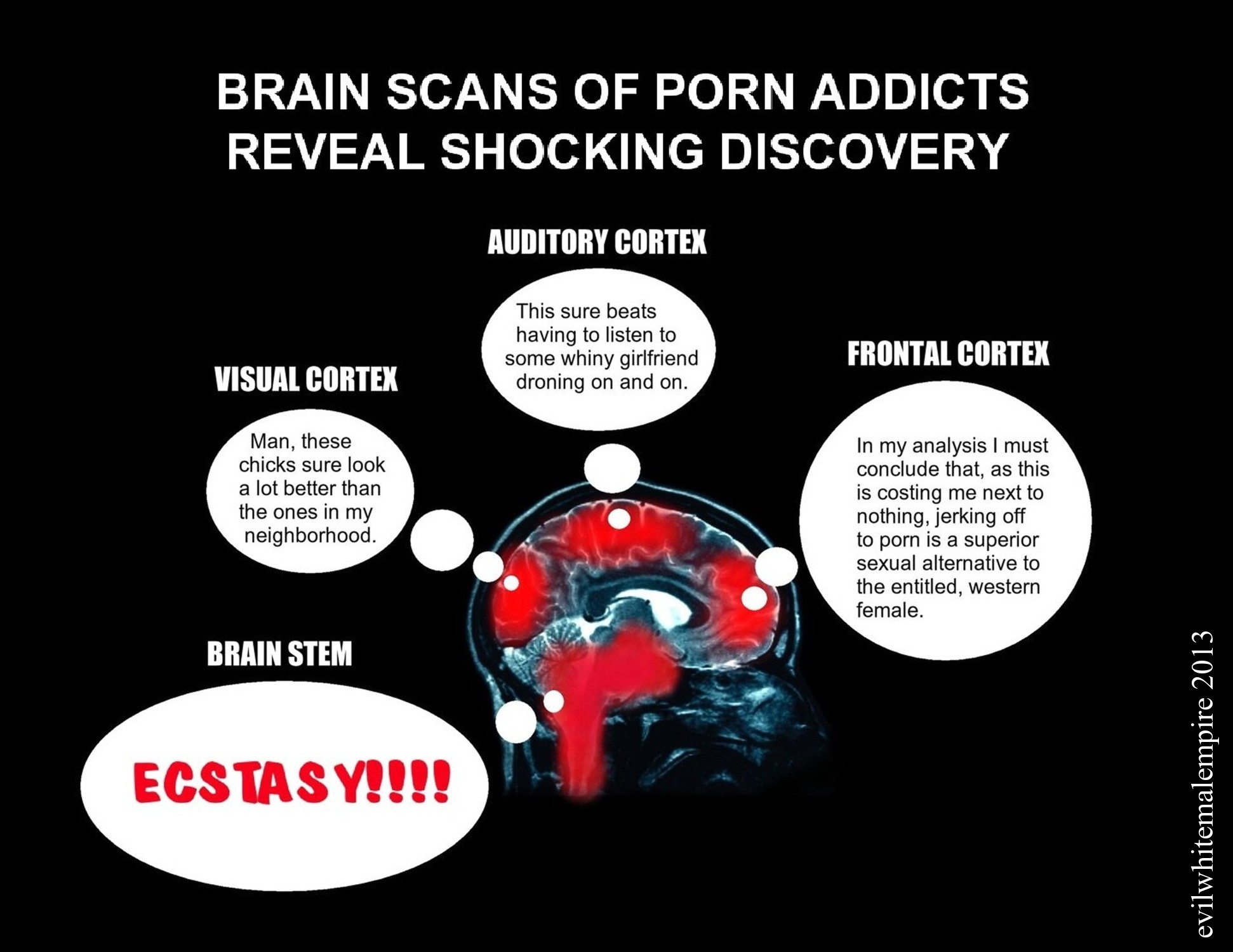I’m always wary of any mainstream media ‘fact checking’ some popular belief or story, especially when it’s the BBC. Most of us know that it’s usually an exercise in left-wing thought control, not so dissimilar to Orwell’s ‘Ministry of Truth’ correcting ‘thought crime’. However, last week the BBC Science Focus magazine took a look at the popular idea that porn is sinful and makes you go blind. Sorry, I mean the idea that porn is addictive and can shrink the brain and cause erectile dysfunction. And fair play to the BBC on this occasion – it seems that they have really taken an objective and critical look at the evidence..and found it wanting.
I wont go into the history of the ‘Porn Addiction’ myth, or the related NoFap cult. Suffice to say that it has been championed by feminists, conservatives, PUAs, and even so-called ‘sexualists’. But as the BBC highlights, look closer at the small number of studies that supposedly prove that porn causes harm, and it’s little more than junk science.
One study that inspired countless scare headlines around the world purported to show that time spent watching porn was correlated with having a smaller brain. Specifically, the male participants who watched more porn had less grey matter in a subcortical region near the front of the brain thought to be involved in processing reward.
It does sound rather worrying, but, as with all correlational studies, a large dose of caution is required. It’s just as likely that the men with a smaller reward-processing brain area were more attracted to porn (and likely other stimulating activities), than that the porn itself shrank their brains.
Another related and widely reported claim about the harmful effects of porn relate to problems with arousal, especially for men. Put starkly, the suggestion is that frequent users of porn get so used to finding sexual satisfaction on their own with the help of pornography that they can no longer get an erection in real-life sexual encounters.
Again, however, the truth appears more nuanced. At least one major study from the University of California, Los Angeles (UCLA), in the US, found that watching more porn was actually associated with more sexual desire for one’s partner.
To get a more complete picture of the effects of porn on sexual function, Rowland and his colleagues examined over 50 relevant studies.
“What we have demonstrated is simply this,” he explains, “widespread claims that pornography use during masturbation impairs sexual response during partnered sex or ruins sexual relationships are generally not supported by the research literature.”
I’ve always felt that gurus like Eivind Berge who believe they are or were ‘addicted to porn’, are simply projecting their own values (or values brainwashed into them) on to their behaviour. The Auckland-based therapist and author Dr Luke Sniewski agrees.
“In both my doctoral research and clinical experience, the emotional burden of shame and guilt often exacerbates the problem,” he says.
“When someone views their behaviour as morally wrong or feels intense guilt, it can create a negative cycle where they feel worse about themselves and use porn as a way to cope, only reinforcing the cycle.”
In fact, Grubbs and others argue that the very notion of ‘porn addiction’ is misguided and extremely unhelpful. One technical reason that it’s not straightforward to apply an addiction framework to porn use is that there’s no physiological withdrawal when a person stops using porn, as you might find with alcohol or drug addiction.
https://www.sciencefocus.com/wellbeing/porn-addiction
When people attack porn as dangerous, whether a feminist or a Christian, what they really mean is masturbation is dangerous. And the reason why masturbation has been seen as evil hasn’t ever changed. It’s an alternative to sex and reproduction. Christians obviously can’t accept that, and neither can the Sexual Trade Union.

This is interesting, although I am a bit disappointed at the last part about there being “no physiological withdrawal when a person stops using porn, as you might find with alcohol or drug addiction”.
Hard drugs like cocaine and meth are known not to cause any physiological withdrawal. You can go cold turkey, ie stop dead using those drugs and you will not get sick like you would going cold turkey on opiates or alcohol.
Instead cocaine and meths are known to cause “craving” (both while you’re using them and after you stop using them). The difference is not academic, it means you can stop cocaine and meth and not get sick. With opiates and alcohol you need to taper off or have substitution therapy once you stop.
Proponents of porn addiction could argue on the same line as I’m doing now, insisting porn causes craving even if causing no withdrawal.
This being said, even if porn is addictive, so what? An addiction that doesn’t impair your health is just a “habit”. What is our lives if not the sum total of its habits?